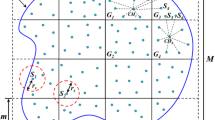Abstract
Target tracking is a killer application in wireless sensor networks (WSNs). Energy efficiency is one of the most important design goals for target tracking. In this paper, we propose a herd-based target tracking protocol (HTTP) with the notions of node state transition and herd-based node group for target tracking. A sensor node has three states, namely, sleeping state, sensing state, and tracking state. Each sensor node is associated with a weight to be used to make a state transition among the three states. When a target moves into a monitoring area, a cluster node is selected as the herd head that is responsible for reporting the target information to the sink in the network. The sensor node can adjust the frequency of data reporting according to the velocity of the target. Simulation results show that HTTP not only improves the energy efficiency, but also enhances the tracking accuracy.
Preview
Unable to display preview. Download preview PDF.
Similar content being viewed by others
References
Akyildiz, I.F., Su, W., Sankarasubramaniam, Y., Cayirci, E.: Wireless Sensor Networks: A Survey. Computer Networks 38(4), 393–422 (2002)
Culler, D., Hong, W.: Wireless Sensor Networks. Communications of the ACM 47(6), 30–33 (2004)
Xu, Y., Winter, J., Lee, W.: Prediction-Based Strategies for Energy Saving in Object Tracking Sensor Networks. In: Proceedings of the 2004 IEEE International Conference on Mobile Data Management, pp. 346–357 (2004)
Lee, W.C., Xu, Y.: On Localized Prediction for Power Efficient Object Tracking in Sensor Networks. In: Proceedings of the 23rd International Conference on Distributed Computers Systems Workshops, pp. 434–439 (2003)
Niyogi, K., Mehrotra, S., Venkatasubramanian, N., Yu, X.: Adaptive Target Tracking in Sensor Networks. In: Proceedings of the 2004 Communication Networks and Distributed Systems Modeling and Simulation Conference, pp. 253–258 (2004)
Wang, G., Bhuiyan, M., Zhang, L.: Two-Level Cooperative and Energy-Efficient Tracking Algorithm in Wireless Sensor Networks. To appear in Wiley’s Concurrency and Computation: Practice and Experience (2009)
Wang, G., Wang, H., Cao, J., Guo, M.: Energy-Efficient Dual Prediction-Based Data Gathering for Environmental Monitoring Applications. In: Proceedings of the 2007 IEEE Wireless Communications and Networking Conference (WCNC 2007), pp. 3516–3521 (2007)
Xu, Y., Heidemann, J., Estrin, D.: Geography Informed Energy Conservation for Ad Hoc Routing. In: Proceedings of ACM Mobile Computing and Networking, pp. 70–84 (2001)
Gui, C., Mohapatra, P.: Power Conservation and Quality of Surveillance in Target Tracking Sensor Networks. In: Proceedings of the Annual International Conference on Mobile Computing and Networking, pp. 129–143 (2004)
Guo, M., Olule, E., Wang, G., Guo, S.: Designing Energy Efficient Target Tracking Protocol with Quality Monitoring in Wireless Sensor Networks. The Journal of Supercomputing (2009), doi:10.1007/s11227-009-0278-5
He, T., Vicaire, P.A., Yan, T., et al.: Achieving Real-Time Target Tracking Using Wireless Sensor Nnetworks. In: Proceedings of the Twelfth IEEE Real-Time and Embedded Technology and Applications Symposium, pp. 37–48 (2006)
Lee, J., Cho, K., Lee, S.: Distributed and Energy-Efficient Target Localization and Tracking in Wireless Sensor Networks. Computer Communications 29, 2494–2505 (2006)
Zhang, W., Cao, G.: DCTC: Dynamic Convey Tree-Based Collaboration for Target Tracking in Sensor Networks. IEEE Transactions on Wireless Communication 11(5), 1689–1701 (2004)
Zhang, W., Cao, G.: Optimizing Tree Reconfiguration for Mobile Target Tracking in Sensor Networks. In: Proceedings of IEEE InfoCom, pp. 434–2445 (2004)
Xu, Y., Heidemann, J., Estrin, D.: Geography Informed Energy Conservation for Ad-hoc Routing. In: Proceedings of ACM Mobile Computing and Networking, pp. 70–84 (2001)
Sun, L., Li, J., Chen, Y., et al.: Wireless sensor networks (in Chinese). Tsinghua University Press, Beijing (2005)
Heinzelman, W., Chandrakasan, A., Balakrishnan, H.: Energy Efficient Communication Protocol for Wireless Microsensor Networks. In: Proceedings of the 33rd Hawaii International Conference on System Sciences, pp. 3005–3014 (2000)
Niculescu, D., Nath, B.: Ad Hoc Positioning System (APS). In: Proceedings of the 2001 IEEE Global Telecommunications Conference (GLOBECOM 2001), pp. 2926–2931 (2001)
Varga, A.: The OMNeT++ Discrete Event Simulation System. In: Proceedings of the European Simulation Multiconference (ESM 2001), pp. 319–324 (2001)
Author information
Authors and Affiliations
Editor information
Editors and Affiliations
Rights and permissions
Copyright information
© 2009 Springer-Verlag Berlin Heidelberg
About this paper
Cite this paper
Xing, X., Wang, G., Wu, J. (2009). Herd-Based Target Tracking Protocol in Wireless Sensor Networks. In: Liu, B., Bestavros, A., Du, DZ., Wang, J. (eds) Wireless Algorithms, Systems, and Applications. WASA 2009. Lecture Notes in Computer Science, vol 5682. Springer, Berlin, Heidelberg. https://doi.org/10.1007/978-3-642-03417-6_14
Download citation
DOI: https://doi.org/10.1007/978-3-642-03417-6_14
Publisher Name: Springer, Berlin, Heidelberg
Print ISBN: 978-3-642-03416-9
Online ISBN: 978-3-642-03417-6
eBook Packages: Computer ScienceComputer Science (R0)




